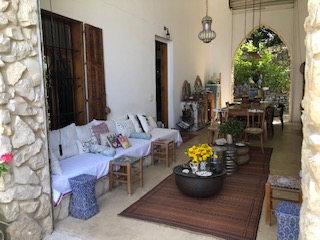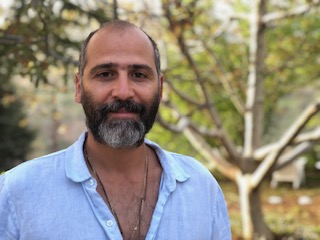Lebanon crisis: Boutique hotels pivot in the age of ‘Lollars’
Inequality is worsening in Lebanon as the economic and financial crisis stretches into its 18th month. But some boutique hotel owners are leveraging what spending power remains to beat the odds.

Beirut, Lebanon – Call it a tale of two Lebanon’s. With a twist. Or rather, a pivot.
Bust-ups in supermarkets and runs on staples have become a daily fixture of life in the economically ravaged nation, as more people fall into poverty while food prices skyrocket.
Keep reading
list of 4 items‘No food in the fridge’: A gruelling Ramadan in Lebanon
‘No one cares’: Lebanon’s financial crisis and domestic workers
Foreign lenders cutting ties with Lebanon’s central bank: Sources
Meanwhile, Lebanon’s small percentage of haves are escaping to plush boutique hotels up in the mountains and down by the seaside for weekend getaways.
To be sure, this is a tale about ever-widening inequality. Lebanon’s economic and financial crisis is stretching into its 18th month, hampering an effective response to the COVID-19 pandemic. A significant portion of the population is not expected to be inoculated against the coronavirus that causes COVID-19 until the middle of next year.

Meanwhile, political sclerosis continues to obstruct the necessary reforms to unlock desperately needed international financial aid. The World Bank reckons more than half of Lebanon’s population is currently living below the poverty line. The economy shrank 25 percent last year, according to International Monetary Fund (IMF) figures, while inflation hit 88 percent. The outlook is so uncertain that the IMF won’t even make a call as to how bad things could get this year.
Now for the pivot – because against this backdrop of ever-deepening despair, some small businesses continue to rail against the odds. A closer look at the boutique hotel industry reveals how entrepreneurs are adapting to Lebanon’s new economic reality and managing to leverage the spending power that the country’s shrinking middle and upper classes are maintaining – at least for now.
Semi-frozen accounts
Colette Khalil runs one such boutique hotel, Beit al Batroun, about an hour and a half from Lebanon’s capital Beirut. It is named after the coastal city of Batroun, popular for its beaches, seafood, and Roman ruins.
The hotel is exquisite. Khalil, particular to detail, says the key to her success is the atmosphere of tranquility for guests escaping the working week and the weekend’s hedonistic buzz in Beirut’s pubs and clubs. She lived in Saudi Arabia and England with her husband for years before she returned to realise her dream of opening a hotel on a hilltop overlooking the glistening waters of the Mediterranean.
“Before the revolution of October 2019, we did amazing business,” she told Al Jazeera, leaning on a stone wall on a terrace lined with artisanal chairs and with a small pool on the side. “Eighty percent of our clients were from France, Switzerland, New Zealand and other such places.”

But COVID-19 restrictions limited the travel of western tourists, including wealthier members of the Lebanese diaspora. Khalil says that even so, the weekends were still booked out because the shortfall of tourists who did not travel to Lebanon was matched by business from inside the country.
“Lebanese here could not travel abroad so they decided to explore Lebanon and took holidays within the country, whenever the lockdowns were lifted,” said Khalil.
Most of those taking time out in Lebanon’s boutique hotels and country guest houses are upper-middle-class locals. Despite vicious inflation that has seen the Lebanese pound plummet from its stubborn official exchange rate of 1,500 to $1 in 2019 to a recent market rate low of 15,000 to $1, some people still have money to spend.
And thanks to exceptional rules unilaterally imposed by banks during the ongoing crisis, they are motivated to spend it. Those rules limit cash withdrawals but not purchases made with bank cards, meaning people can splash cash from semi-frozen accounts that they fear may be lost to formal bankruptcy proceedings at any time.
But these more well-off Lebanese didn’t find their way to Beit al Batroun all on their own. Many were lured by discounted rates.
“Most of the clientele is upper middle class but even they could not pay the earlier prices, so we had to reduce the tariff nearly by half,” said Khalil.
The cost for a night in a sea-view room was reduced from $190 to $110. Visitors pay the amount in dollars or at the converted market rate in Lebanese pounds.

“It took us a really long time to adjust our prices,” said Khalil. “We have a group on Instagram for best bed and breakfast in Lebanon and we discussed for a month how to adjust to the market, to cater for less to more when the value of the currency has plummeted so sharply.”
Entrepreneurs like Khalil were forced to pivot to the real, inflation-adjusted value of the local currency on their own since Lebanon’s ruling and financial elite have failed to stabilise it.
Philippe Germanos runs a sprawling guest house in the foothills of a snow-covered mountain range in Akoura village. With waterfalls, a gushing river, and hiking treks nearby, Guita Bed & Bloom is popular among those looking for a more organic homestay experience surrounded by natural beauty.
Before the crisis, Germanos’s guest house would be thronged by a whole range of middle-class Lebanese, but the clientele has tapered to the upper-middle classes who can afford to stay. He, too, has slashed prices from $110 to $50 a night.

“They come because they have Lollars stuck in their banks,” said Germanos, referring to the local slang for the new currency thrown up by the crisis, United States dollars frozen in Lebanese accounts. “This way they can at least use the money that is stuck that they might never be able to withdraw. It’s better to take a day off than let it rot in the banks.”
Waiting for the IMF
Germanos and Khalil have only managed to scrape by. Even though their properties are booked out already for several more weekends, they don’t expect to make a huge profit. Nor do they expect that a government will be formed any time soon in Lebanon, and even if it does they have no expectation it will change anything.
Sami Nader, a Lebanese political analyst, says Lebanon needs a government that can be trusted by the international community to rescue the country from the debilitating financial crisis, and not the return of the old ruling elite.
“We don’t just need any government, but one that is capable of bringing cash from outside,” said Nader. “The only way to rescue the country is to get a loan from the International Monetary Fund and the IMF will lend only if the future government ushers in meaningful reforms. With the same guys in power that would never happen.”
The political and the banking elite are blaming each other for the crisis instead of owning up to the mess they have between them created.
Nassib Ghobril, the chief economist of Byblos Bank, defended the banking sector. “Banks do not live on a remote island that protects them from the prevailing conditions in Lebanon,” he said. “The banks are suffering, like any other sector, from the crisis of confidence that erupted in September 2019, as well as from the lack of political will to implement reforms and measures to stop the economic, financial and monetary deterioration in the country.”
It is true that, to some extent, everyone in Lebanon has been an unwilling participant in the failed political and financial policies that pushed the country over the economic cliff. But while no one takes responsibility, small business owners are being left to negotiate their own economic solutions, while the lesser off face an even greater struggle to survive.